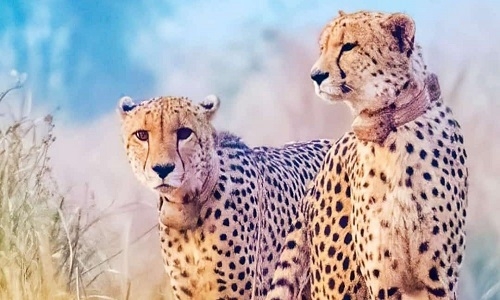Veterinary team to remove collar IDs of all ten cheetahs in Kuno
| Date :20-Jul-2023 |

By Ankita Garg
BHOPAL,
In order to keep the cheetahs surviving at Kuno National Park in Madhya Pradesh, veterinary team has started treatment of three cheetahs who were found to be infected with the collar ID. A three-member team from NTCA Bengaluru, comprising of IG N S Murli and AIG Venugopal Hirani and South African wildlife expert Mike Toft, who will be reaching Kuno National Park in two days, reached Kuno National Park for further monitoring of cheetahs. After the death of eighth cheetah Suraj, monitoring team checked the health of other cats and found deep wound on neck of five more cheetahs Pawan (Oban), Elton and Freddy. Veterinary doctors are trying to heal the wounds of Gaurav (Elton) and Shaurya (Freddy) by tranquillisation. Last week both Suraj and Tejas died of infection.
The three cheetahs are under strict monitoring of team. Officials have decided to remove the collar ids of all cheetahs and further check-up will be held in detail to find the reason of infection in cats. Experts said that the collar ids are designed for tiger’s neck due to which they are not comfortable for the cheetah. Sources said that officials have planned to tranquillised all the ten cheetahs from free range for treatment. Officials have targeted to remove the collar id of all cheetahs by rainy season and they will be released into wild after end of the monsoon. Experts said that tiger’s skin is hard and strong while cheetah has flexible neck. When a cheetah run, his neck and head moves due to which collar id is giving scratches on their neck and resulting into wound.
Meanwhile, in a major development in the Cheetah Project, Principal Chief Conservator of Forest (Wildlife Warden) was removed with immediate effect from the post. There were eight cheetahs brought from Namibia and 12 cheetahs from South Africa. At present, 10 cheetahs are independently roaming in free range of Kuno and five cheetahs are in enclosure. All these cats are under strict monitoring of the team. A research team from Wildlife Institute of India (WII) is present there in Kuno for the better implementation of project. Government has also asked forest authorities to increase the number of guards and also extend the area of cats.